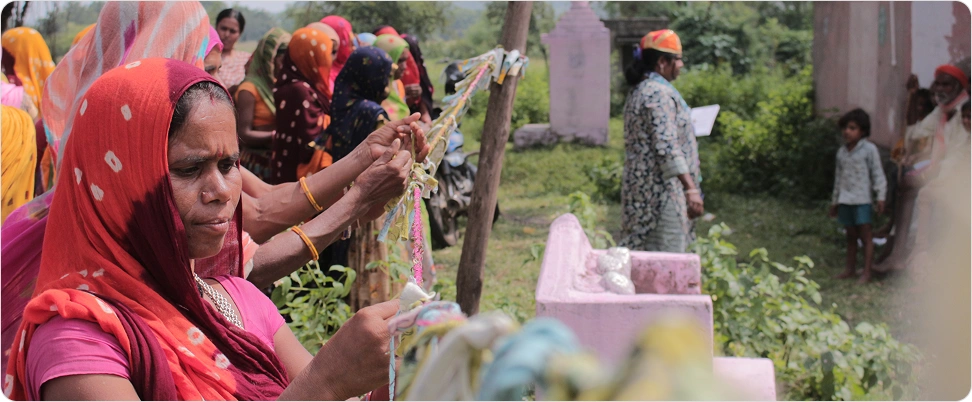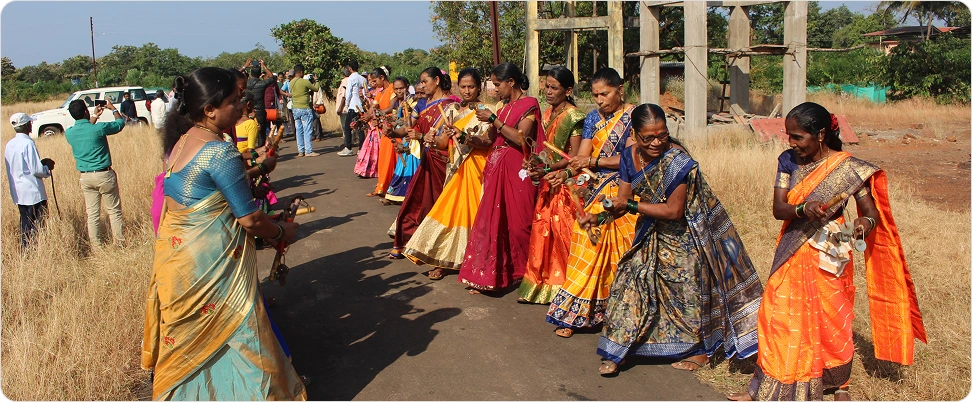The Uncomfortable Truths We Uncovered
The journey of Gram Swabhimaan has been one of uncovering raw, often uncomfortable truths about the world around us. What started nearly three decades ago with restlessness and curiosity—to observe, to question, and to document the overlooked—has evolved into something deeper.
Gram Swabhimaan session, Banswara, Rajasthan, Sep 2022
At the very heart of this life’s work lies Goonj. For over 25 years, we’ve poured ourselves into shifting the development narrative—challenging the binaries of giver vs receiver, urban provider vs rural beneficiary, and the flawed hierarchy of help. We’ve long questioned the pedestal from which “development” is often delivered.
The Question That Sparked It All
Around four years ago, in 2021, Gram Swabhimaan emerged—not as a project, but as a response to a deeply troubling realization: that many villages in India had begun to see themselves as poor. Not just economically, but emotionally. Psychologically. Socially.
Repeatedly told they are less, communities started believing it
It was heartbreaking.
When “Poverty” Becomes a Mindset
Urbanization, widening digital divides, and the rural–urban cultural gap have only deepened this internal erosion. Rural India, once proud of its land, its wisdom, and its self-sufficiency, now chases urban definitions of success—often at the cost of its identity.
This chase brings with it insecurity. And insecurity, when reinforced over time, becomes a label. A child constantly told he is slow begins to live that label. So do communities.
And Yet, So Much Wisdom
But that narrative doesn’t hold when you listen.
Farmers who grow 5,000+ indigenous rice varieties. Villagers who graft mangoes using age-old techniques. Women who detect underground water using a coconut. These are not signs of poverty. They are indicators of deep-rooted, unacknowledged intelligence and cultural wealth.
This is the real India. The one that mainstream development often overlooks.
Gram Swabhimaan session, Banswara, Rajasthan, Sep 2022
The Shift We Need
Gram Swabhimaan is about changing the script.
It’s about helping communities remember who they are. About shifting the focus from what’s “missing” to what’s present—abundant, living, powerful.
Because when people rediscover their own value, everything changes.
A tree becomes more than a tree—it becomes identity. A patch of land becomes possibility. And poverty stops being a label.
One day, in a village conversation, we asked the group:
“Are you poor?”
Many hands went up.
These same people had just finished sharing how they conserve seeds, repair their own irrigation channels, and heal one another with traditional knowledge.
Then one woman, Elita, stood up and said:
“No. We are not poor.”
Gram Swabhimaan session, Ratnagiri, Maharashtra, Nov 2022
Her words stopped the room. And then they started something bigger.

